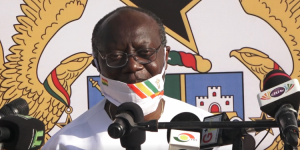The country’s infrastructure deficits, in terms of road and railways, is estimated at $17 billion, with road infrastructure deficit accounting for US$7 billion while railways infrastructure is also lacking behind at a projected figure of US$10 billion, the Minister for Railways Development, John Peter Amewu, has said.
The development puts the country far behind several countries across Sub-Saharan Africa, in road infrastructure ranking in the World Economic Forum Index. The transport sector is a critical contributor to the country’s socio-economic development. “Sustainability, in terms of growth of every country, has its partial in-depth drive from the transport system,” Mr. Amewu stated.
To this end, the Minister said the government’s commitment to put in place a modern transport system through the strategic effort to develop and strengthen the individual transport system is on course.
He said it has, for instance, led to a huge capital injection in the railways’ sector at the moment, which is more than it has seen in decades. This is also said to be in line with the pursuit to achieve a legacy of a modern railways system with efficient connectivity, within the country.
The new Railways Master Plan, according to Mr. Amewu, has a connectivity plan to link between Ghana, Burkina Faso, Togo and Ivory Coast.
The Minister of Railways Development, who was addressing participants at the ‘Transport Sector Review Conference,’ in Kumasi, highlighted several projects being undertaken by the Ministry in the realization of the government’s vision to put in place a modern railways system.
He, however, acknowledged that the inadequacies of the various forms of infrastructure, including transport, energy, sanitation among others, affect the efficiency and competitiveness of any nation.
Against this background, he said the technical plans and financial strategies for the development of adequate transport infrastructure system, to support the country’s infrastructure efforts are important policy decisions.
The Minister of Transport, Kwaku Ofori Asiamah, also said as part of the government efforts to ensure that the country becomes the transportation hub of West Africa, several projects including in the area of maritime are being undertaken.
However, the Director-General of the National Development Planning Commission (NDPC), Dr. Kodjo Mensah-Abrampah, said: “the agenda of making Ghana the transportation hub within the West African Sub-region requires several that challenges accompanying the transport sector must be addressed.”
These include the poor maintenance of transportation infrastructure, which he said has dire consequences on economic development. “Also, there is poor intermodal infrastructure. This creates significant barriers for opportunities to explore the benefits of intermodal coordination.”
Despite these among others, he said there exist opportunities for enhancing the transport sector citing the Ghana Infrastructure Plan among others.
The Country Manager, of the African Development Bank – Ghana Country Office, Eyerusalem Fasika, also addressing participants at this year’s conference, said the impacts of infrastructure development and regional connectivity on the economic performance of the country have been tangible.
She said development partners have through various projects such as the Abidjan-Lagos Trade Facilitation Project by the World Bank, West Africa Growth Ring Corridor Master Plan by JICA, and the Kotoka International Airport Terminal Three by AfDB, have helped to solidify the strategic position Ghana holds
Against this background, she said there is the need for the country to maintain the momentum of development partners by further expanding and strengthening the partnership between the government, development partners, private sector and other key stakeholders.
To enhance growth, she said the country must chart a new development trajectory that requires complementary advancement in physical infrastructure. She noted that expanding and modernizing the nation’s transport sector is critical, given that a large infrastructure deficit combined with rapid urbanization are visibly among the main challenges to Ghana’s development agenda.
The Transport Sector Review Conference, an annual event, provides all stakeholders in the transport sector to share perspectives and knowledge. It was held under the theme, ‘Consolidating the Gains in the Transport Sector through Effective Integration’.







